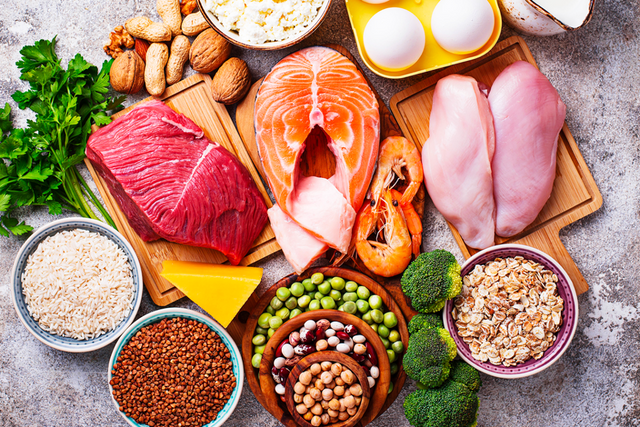10 Nutrition Tips for Building Muscle Mass
10 Nutrition Tips for Building Muscle Mass
Muscle isn’t built in the gym. In fact, your workout is actually breaking down your muscle fiber and putting you in a catabolic, or muscle-wasting, state. To switch to an anabolic, muscle-building state, you’ve got to feed your body with the right nutrients at the right time. Unless you do that, all of your hard work in the gym will be for nothing.
In this article, I’ll lay out 10 mass-building tips that allow you to provide the ideal muscle-building nutritional environment to add some serious muscle to your frame.

Tip #1: Establish a Caloric Surplus
Establishing a caloric surplus is essential for muscle growth. Building muscle requires energy, and a caloric surplus provides the body with the necessary energy to build new muscle tissue.
A caloric surplus helps to stimulate protein synthesis, which is important for muscle growth.
It will also provide the body with the necessary energy and nutrients to support recovery and reduce muscle breakdown.
Here are 5 things you can do to ensure that you are establishing a daily caloric surplus:
- Calculate your caloric needs: Determine your daily caloric needs based on your age, weight, height, and activity level. You can use an online calorie calculator to help you do this. Aim to consume 250-500 calorie surplus to support muscle growth.
- Track your food intake: Use a food diary or an app to track your food intake and make sure you are consuming enough calories to support muscle growth.
- Eat nutrient-dense foods: Focus on eating nutrient-dense foods, such as lean protein, healthy fats, and complex carbohydrates, to support muscle growth and overall health.
- Increase portion sizes: Gradually increase portion sizes and the frequency of meals to make sure you are consuming enough calories to support muscle growth.
- Monitor progress: Regularly monitor your body weight and body composition to make sure you are making progress and adjust your calorie intake as needed.

Tip #2: Increase Your Protein Intake
Protein is important for muscle mass because it is the building block of muscle tissue. When we consume protein, it is broken down into individual amino acids, which are then used by the body to repair and build muscle.
Here are some of the best food sources of protein:
- Meat: Beef, pork, lamb, and game meats are all excellent sources of protein.
- Poultry: Chicken and turkey are common sources of protein that are low in fat.
- Fish: Fish like salmon, tuna, and halibut are good sources of protein and healthy omega-3 fatty acids.
- Dairy: Milk, cheese, and yogurt are all good sources of protein and calcium.
- Eggs: Eggs are a complete source of protein, containing all of the essential amino acids.
- Legumes: Beans, lentils, and peas are plant-based sources of protein that are also high in fiber.
- Nuts and seeds: Almonds, sunflower seeds, and chia seeds are all good sources of protein.
The recommended daily protein intake for muscle gain varies based on individual factors such as age, weight, and activity level, but a general guideline is to consume 1.6 to 2.2 grams of protein per kilogram of body weight per day.

Tip #3: Keep Your Carb Intake High
Carbohydrates are important when trying to build muscle for several reasons:
- Energy source: Carbohydrates provide energy for high-intensity workouts, which are necessary for muscle growth.
- Muscle glycogen replenishment: After a workout, carbohydrates help replenish glycogen stores in the muscles, which is important for muscle recovery and growth.
- Hormonal response: Consuming carbohydrates can help regulate insulin levels, which is important for muscle building as insulin is a key hormone involved in the muscle-building process.
It's important to note that not all carbohydrates are equal. Choose complex carbohydrates like whole grains, fruits, and vegetables over simple carbohydrates like sugar and processed foods. Aim to consume 3-5 grams of carbohydrates per kilogram of body weight per day.

Tip #4: Consume Healthy Fats
Fats are an important energy source for the body, especially during low-intensity activities and rest periods. Certain fats, like omega-3 fatty acids, are also important for regulating hormone levels, which play a role in muscle growth and recovery.
Fats help the body absorb fat-soluble vitamins like vitamins A, D, E, and K, which are important for overall health and muscle function.
It's important to choose healthy sources of fats, such as olive oil, avocados, nuts, and seeds. Aim to consume 20-35% of daily caloric intake from fat.

Tip #5: Eat More Frequent Smaller Meals
Eating 5-6 smaller meals per day instead of 3 larger ones is recommended for muscle growth because it can help:
- Stabilize blood sugar levels: By eating smaller, more frequent meals, it helps to regulate blood sugar levels and prevent spikes and crashes that can affect energy levels and hormone regulation.
- Increase protein synthesis: Eating protein throughout the day helps to keep the muscles in a constant state of protein synthesis, which is important for muscle growth.
- Improve nutrient absorption: Eating smaller, more frequent meals can help improve nutrient absorption and utilization.
- Prevent overeating: Eating smaller, more frequent meals can help prevent overeating and control portion sizes.

Tip #6: Consume Fast-Digesting Carbs Immediately After Your Workout
Consuming fast-digesting carbohydrates immediately after a workout can be beneficial for muscle growth for several reasons:
- Replenish glycogen stores: Workouts deplete glycogen stores in the muscles, consuming fast-digesting carbohydrates after a workout helps to quickly replenish these stores, which is important for muscle recovery and growth.
- Increase insulin sensitivity: Consuming carbohydrates after a workout can increase insulin sensitivity, which helps to drive nutrients into the muscles for recovery and growth.
- Enhance recovery: Fast-digesting carbohydrates can help to quickly increase blood sugar levels, which can enhance recovery and reduce muscle breakdown.

Tip #7: Have a Whey Protein Shake After Your Workout
Having a whey protein shake after a workout quickly increases protein synthesis. Whey protein is a fast-digesting protein that can quickly increase protein synthesis in the muscles, which is important for muscle growth and recovery.
Whey protein powder supports muscle recovery by providing the necessary amino acids to support muscle recovery and repair after a workout. Whey protein powder is also a convenient and easily digestible source of protein, making it a great option to consume immediately after a workout.
There is some research suggesting that having a whey protein shake after a workout can improve athletic performance and reduce muscle damage. [1]
It's important to note that not all whey protein powders are equal. Choose a high-quality whey protein powder that is low in added sugars and artificial ingredients.

Tip #8: Drink Plenty of Water
Drinking plenty of water is important when trying to build muscle for the following reasons:
- Supports muscle recovery: Water helps to support muscle recovery and reduce muscle soreness by flushing out waste products and delivering nutrients to the muscles.
- Aids in digestion and absorption of nutrients: Proper hydration is important for proper digestion and absorption of nutrients, which is important for muscle growth and recovery.
- Regulates body temperature: Water helps to regulate body temperature, which is important during intense physical activity, such as weightlifting, to prevent overheating and dehydration.
- Supports overall health: Proper hydration is important for overall health and can help prevent chronic conditions, such as kidney stones and urinary tract infections.
Aim to drink at least 8 glasses of water per day and adjust your water intake based on your individual needs, such as your level of physical activity and climate.

Tip #9: Never Skip Breakfast
Breakfast is important for muscle building because it provides the body with essential nutrients and energy after an overnight fast, and jumpstarts metabolism for the day. Eating a balanced breakfast with protein, carbohydrates, and healthy fats can help support muscle growth and repair, and maintain stable blood sugar levels during the day.

Tip #10: Include 4 Key Supplements
The best supplements to take to build muscle vary based on individual needs and goals. However, the following supplements are commonly recommended to support muscle growth:
- Protein powders: Protein powders, such as whey or plant-based protein, can help increase protein intake and support muscle growth and recovery.
- Creatine: Creatine is a naturally occurring substance that can help increase strength and power during high-intensity exercise, which is important for building muscle.
- Beta-alanine: Beta-alanine is an amino acid that can help improve endurance and reduce muscle fatigue during high-intensity exercise.
- Branched-chain amino acids (BCAAs): BCAAs are a group of essential amino acids that can help reduce muscle breakdown and support muscle growth and recovery.
It's important to remember that supplements should be used in conjunction with a balanced diet and proper exercise program.
Summary
Building muscle mass requires a well-rounded diet that provides plenty of calories, protein, carbohydrates, healthy fats, hydration, and nutrients. By implementing the 10 diet tips provided in this article and combining them with consistent, progressive resistance workouts you will be able to add quality, fat-free muscle tissue to your body.
References
[1] Huang WC, Chang YC, Chen YM, Hsu YJ, Huang CC, Kan NW, Chen SS. Whey Protein Improves Marathon-Induced Injury and Exercise Performance in Elite Track Runners. Int J Med Sci. 2017 Jun 22;14(7):648-654. doi: 10.7150/ijms.19584. PMID: 28824296; PMCID: PMC5562115.
About the Author
Steve Theunissen is a freelance writer living in Tauranga, New Zealand. He is a former gym owner, personal trainer and school teacher and is the author of six hardcopy books and more than a hundred ebooks on the topics of bodybuilding, fitness and fat loss. Steve also writes history books with a focus on the history of warfare. He is married and has two daughters.




0 Comments
There are no comments for this article. Be the first one to leave a message!